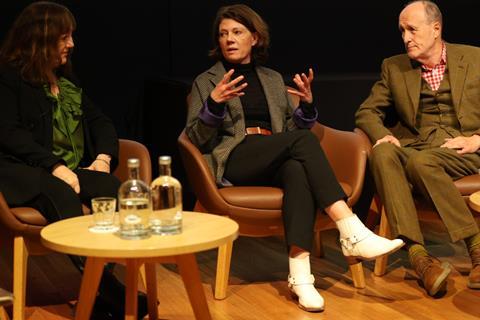
Speakers at the 2025 British Screen Forum conference did not pull their punches when discussing the challenges facing the UK screen industries. Issues including a lack of viable financing routes for producers, a disconnect between industry and policymakers, and a need to build a stronger presence for UK film on the international stage were all fiercely discussed in London last week.
The forum featured Isabel Davis, executive director of Screen Scotland; Danny Cohen, president of financier Access Entertainment; writer-director Richard Curtis; Ian Murray, creative industries minister; Grace Carley, chief executive of Film Export UK; Anna Higgs of UK production company Character 7; Peter Bazalgette, co-chair of the Creative Industries council; BFI’s head of audiences Ben Luxford; filmmaker Isabella Eklof; and Andrew Bennett, vice president of global distribution at Amazon’s Prime Video.
Financing needs a “radical” shake-up
The hottest topic was the need to find more ways for UK producers to access financing. “It is the most difficult landscape I’ve ever seen for independent film finance,” said Anne Sheehan, a film finance executive at AS Media Consulting. “Some of that is the distribution has got much harder, the streamers have disrupted things and devalued the value of films… Costs have gone up, but the rewards have gone down.”
Stephen Welton, the non-executive chair of the British Business Bank, noted the bank is the largest investor in venture capital in the UK, with a 20% market share, and the UK is the third largest venture capital market behind the US and China.
He said, “We are trying to understand, and we’ve had a lot of round tables with some of the people in this room and others [in the creative sectors], how do we find ways to reflect what you need, and then we work through others to deliver that?”
The British Business Bank is a government-owned development bank set up in 2014 to help businesses in the UK access financial support. It received a £4bn funding boost earlier this year for the government’s eight priority sectors, which include the creative industries.
Welton added, “If it’s going to be truly successful in terms of scaling up the British economy to meet the various opportunities that we’ve got, clearly the government and the British Business Bank cannot do that on its own. The very big policy area is pension funds. How can we get UK pension funds to invest more in the UK?”
Access Entertainment’s Cohen noted that, in a difficult climate, financier Access, a division of Len Blavatnik’s Access Industries, had largely withdrawn from investing in TV. Instead, Cohen said Access is investing in film, as well as the creator economy, immersive entertainment, micro-dramas, gaming and theatre. The company’s film investments include slate backing for US company A24 and a development deal with the UK’s House Productions. Outside of gaming and theatre, London-based Cohen noted of Access’ investments, “Almost everything else is US.”
He believes consolidation within the UK industry is essential. “We need some radical consolidation in the UK creative sector, and it’s going to need some brave steps to do so. We need more scale, reduction in production costs by synergies in order to compete better. If Paramount or others want to buy Warner Bros and consolidate there, they know even with their scale, they need to be bigger. We’re nowhere near that scale.
“Personally, I think the Sky-ITV merger has a lot of positives about it because we need more scale. What can BBC and Channel 4 do? I really think we are going to continue to struggle unless we consolidate quite radically and let go of what we think these organisations and institutions have to be.”
Policymakers have missed the mark
Screen Scotland’s Davis expressed frustration at a lack of understanding from previous UK governments and civil servants regarding the fact just because a film or show shoots in the UK with significant UK involvement, it doesn’t mean the intellectual property (IP) rights are held within the UK – as is the case with the big budget studio and streamer productions – and that the value will come back to the UK industry.
“It’s great to be able to talk, as we should do, about the export value of these large British-qualifying shows, but that slightly obscures the value chain that we all know as we work in this industry tells a slightly different picture, about how much of the value of that IP is returning to the UK.”
She also noted that under the Labour government’s creative industries minister Ian Murray – who spoke at the conference earlier in the day – and Chris Bryant before him, “the penny is dropping”.
Davis was speaking on a panel discussion on the UK’s soft power. Another issue on which she said she believed policymakers have not paid enough attention to the creative industries is that of protecting creative copyright in the face of AI.
“It was a hair-raising moment to see the British government fundamentally misunderstand the value of copyright and throw its lot so fundamentally with the tech bros in that debate,” Davis said in reference to the controversial passing of the Data (Use and Access) Bill in June, which enables tech companies to train AI on copyrighted material.
Later in the day, Tom Adeyoola, CEO of the UK’s national innovation agency Innovate UK, elaborated on the disconnect between the policymakers and the creative industries in relation to the Creative Industries Sector Plan, published in June and written by a taskforce of government officials and industry.
“We’re great at storytelling. We’re not great at storytelling without the creative industry. Having been on the creative industries taskforce of the industrial strategy, writing the sector plan, I found it frustrating.
“As a group, we weren’t able to tell that story of, ’What is it that we’re good at? Why are we good at those things? Which are the companies driving success? What are the conditions for success?’” he said. “If you actually went and read all of the [other government target industries’] sector plans, the creative industries is the one that reads the least well, I would say it reads quite like a policy document, rather than something there to inspire.”
Cold shoulder from Europe?
While the UK government may have tried to soften the blow of the country’s departure from the European Union and Creative Europe with the UK Global Screen Fund (for which the latest Labour government increased funding from £7m to £18m per year), the effects of Brexit are still being felt. “We can congratulate them [UK government] on doubling the size of the Global Screen Fund, but it’s not the same, and can never synthesise the effects of Creative Europe,” said Davis.
Carley, chief executive of Film Export UK, the trade body for UK sales agents, added: “From my point of view, the soft power really exists in more historical and traditional sources like literature. There seems to be an endless appetite globally for another Jane Austen adaptation or Shakespeare [adaptation]. The success of our acting talent worldwide is extraordinary.”
However, post-Brexit, “That soft power is slightly ebbing away,” she observed. “The attitude towards the UK within Europe is not as positive as it used to be at all.”
Sales agents are particularly under-resourced compared to our European counterparts, Carley contended. “We need to look at how, particularly my sector, how European countries support those sectors. If you look at France, you’ve got Unifrance, which basically does the job I do with about 100 employees, and I’m a one-man-band. It supports French companies at markets and festivals in a very big way.”
She compared the London Screenings, where the funding Film London receives allows them to invite buyers but “didn’t pay their airfares and gave them a glass of warm white wine,” to Unifrance’s Paris Rendez-Vous, in which “major buyers were invited to Paris for an absolutely fantastic time to see French films, and [Unifrance] spent millions”.
Carley would also like to see the government give more support for UK feature films to be released in Asian territories.
“We need some assistance getting back into markets that appear not to be close to us,” she said. “Huge markets like China and India are, certainly for the feature film side, pretty much closed at the moment for a variety of reasons – censorship and protectionism, but also, the fact that these countries are now creating their own content to a very high level. We need some support getting back into those territories – even somewhere like South Korea that used to be a very strong territory has closed ranks as well.”
Richard Curtis calls for mission-driven filmmaking

Curtis ended the day with a call to action for the industry. “I am someone, most of whose films have been hot cross buns really, whose biggest real effect on the world has been making Hugh Grant visibly more rich and more miserable.”
The Love Actually filmmaker, who also co-founded Comic Relief in 1985, gave this year’s Lord Richard Attenborough Memorial Address. He said he wanted to see more productions employ impact producers, whose job is specifically to transfer the messaging of films into positive real-world change.
He flagged the role of an impact producer is already being utilised on lower-budget documentaries and championed by Doc Society, as with The Territory – a Sundance 2022 film about deforestation in Brazil. But in the scripted world, impact producing is “still a very well-kept secret”.
“When it comes to drama, are we missing a big trick?” he said. “We’re all part of the most important global communication tool on the planet. But after 80 years, do we look back and see enough real-world effects of all the shows and films that have been made?”
When asked what the appetite might be for this role, given how tight budgets are for UK production, Curtis contended: “I’m kind of puzzled by the fact that the people who have used impact production most powerfully so far have been the people in the industry with the least money, small documentaries in independent film.
”It seems curious that they can find a way of doing the maths, but bigger, more powerful programmes and films either don’t think about it, or don’t prioritise it.”

























No comments yet